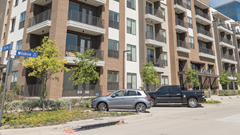Parking Policy Innovations in the United States

Explore a growing collection of policies from cities across the United States in an interactive report featuring a fact sheet library and searchable database
Report Summary: In recent years, cities across the United States have adopted a range of parking policy reforms to manage the existing parking supply, reduce traffic, cut pollution, and bolster city finances. Reforms include eliminating minimum parking requirements for development projects, enabling developments and businesses to share parking facilities, and using technology solutions to efficiently manage the supply of on-street parking.
This interactive report allows users to access information on policies from cities across the United States. A searchable, filterable database includes a range of recent policy examples that represent significant shifts from the status quo depending on the local context.
ULI will periodically update this database. Suggest policies for future inclusion here.
How to Use the Interactive Report’s Database
Users can sort policies by year or location and can filter results by lead agency responsible for the policy or applicability—whether a policy applies citywide, near transit, in specific districts, etc. In addition, users may find it most useful to filter results by policy type. Policy types include:
- Reduction/Elimination of Parking Minimums: Reduces or eliminates requirements for developers to build a set ratio of parking spaces based on project uses, size, and other characteristics
- Parking Maximums/Caps: Restricts the total number of parking spaces that can be constructed as part of a development project
- Shared Parking: Parking spaces are shared by more than one use, which allows parking facilities to be used more efficiently
- Unbundled Parking: Separates parking costs from unrelated charges, such as the cost of housing or an office lease
- Transportation Demand Management (TDM): Maximizes travel options as part of the development process, often through requirements or incentives
- In-Lieu Fee: Gives proposed development projects the option to pay a designated fee instead of providing some or all on-site parking that would otherwise be required by zoning; fees are generally invested in public parking or other transportation infrastructure
- Demand/Performance-Based Pricing: Adjusts public parking meter rates at defined intervals to achieve targets for on-street parking space utilization
- Parking Benefit District: Parking meter revenues from defined zones are returned to those zones and invested in the area, often to support local transportation improvements
The collection of the data for this database was made possible, in part, with support from the Bloomberg Philanthropies American Cities Climate Challenge.
Parking Policies
A database of selected parking policy innovations and reforms from cities across the U.S.
Why Cities Are Advancing Parking Policy Reforms
For nearly a century, cities across the United States and beyond have required new developments to provide a set number of off-street parking spots, but research has shown that these requirements can lead to an oversupply of parking. Cities have also struggled to balance supply and demand for on-street and public parking. In recent years, cities have adopted a range of parking policy reforms.
Types of parking policy reforms include eliminating minimum parking requirements for development projects, enabling developments and businesses to share parking facilities, and using technology solutions to efficiently manage the supply of on-street parking.
These types of reforms have been shown to reduce traffic and associated emissions. They can also free up resources for cities to invest in transit and other infrastructure and can lead to lower real estate development costs—meaning more profitable projects and opportunities to provide affordable housing.
Selected trends influencing parking reforms:
- Historically high construction costs—particularly in dense urban areas—are contributing to housing unaffordability, especially when the high costs of building on-site parking are factored in.
- Changing shopping preferences, along with over-retailing, are leaving acres of parking lots at many shopping malls and retail power centers vacant.
- The popularity of human-powered transportation, such as walking and bicycling, along with the growth of delivery services and the availability of shared mobility services—such as Lyft, Uber, and car-sharing services—is reducing the need for individuals to own—and park—cars.
- Advances in technology are promoting more efficient management of the existing parking supply by using information technology that shares the location of available spaces, supports real-time dynamic pricing, and helps make shared parking options easier.
- An increased focus by municipalities on sustainability, livability, and social equity and a growing body of research show that many current parking requirements promote development patterns that increase traffic congestion, contribute to air pollution, raise housing costs, prevent walkability, and penalize those without automobiles.







